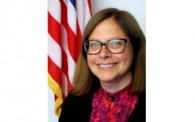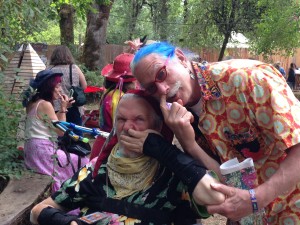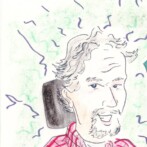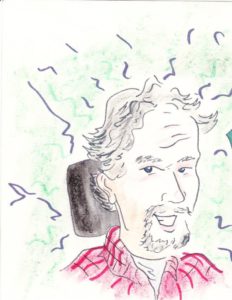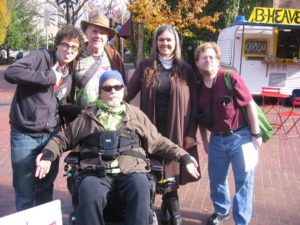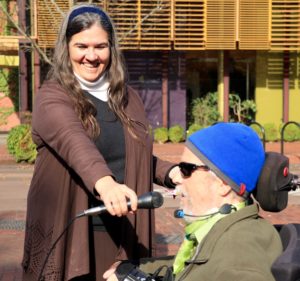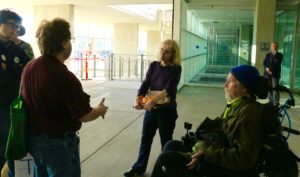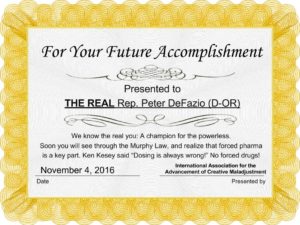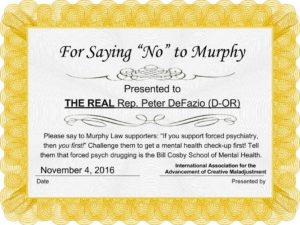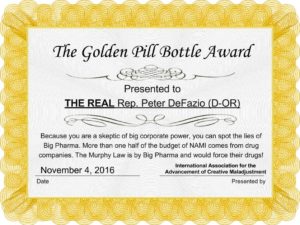Speak Out to Break the Silence: President Trump Appoints Mental Health Leader Who Campaigned for Involuntary Outpatient Drugging
By David W. Oaks
I am a survivor of human rights violations in the mental health system. And even though this was a long time ago, back when I was a college student in the 1970’s, the issues are more relevant than ever. My friend, Patch Adams, MD, has connected the dots for me: Our society needs to be very agile right now, but has to overcome centuries of mental health oppression. But with compassion, we can have a global nonviolent revolution!
Recent events show that mental health human rights violations are important for everyone. MindFreedom International was my employer for 25 years before my accident in 2012. They are an independent, activist group, and we need that energy as never before.
The White House announced this past Friday, 21 April 2017, in the evening, that President Donald Trump has, for a pivotal mental health position, appointed a psychiatrist who openly speaks out for involuntary psychiatric drugging of people living outside of institutions, even in their own homes. This appointee criticizes our social change movement, especially our dedication to empowering peer support and our concerns about psychiatric drugs and labeling. It is important for everyone who supports human rights, especially in the social change movements for disability rights and those critical of mass incarceration, to speak up and oppose this approach.
Please phone your U.S. Senators to block this confirmation. This is a chance to raise these issues, now!
This “Assisted Outpatient Treatment” (as supporters call it) or “Involuntary Outpatient Commitment” (as it is known by many) has been quietly growing on the State level for decades, but is now being funded on the federal level, such as through the enormous 21st Century Cures Act that was passed by Congress at the end of last year. Whatever it is called — AOT or IOC — under these laws judges may order folks to have mental health care, which could be a range of approaches. In my experience, staffing a human rights phone and getting hundreds of contacts for decades, “mental healthcare” for the “seriously mentally ill” almost always includes psychiatric drugging, often with neuroleptics, or “antipsychotic medications” as prescribers often call this family of pharmaceuticals.
Neuroleptic drugs began in the 1950’s with such brands as Thorazine, Stelazine, Haldol, Mellaril, etc., all of which I have had. I personally experienced involuntary neuroleptic injections more than 40 years ago as a college student at Harvard. About five times I was placed in a psychiatric institution for emotional difficulties, and twice I experienced the sharp end of a needle, when in solitary confinement I was held down on the bare mattress and got forced drugging in my butt. I graduated anyway, in 1977, and our class is celebrating its 40th anniversary this year.
Now neuroleptics have dozens of more brands, but many of the hazards and risks are the same. For instance, in the long run there is the danger that many people can experience involuntary twitching that can apparently often be permanent. There is also the long term risk of brain damage and even death. Some folks choose these medications, but others do not. I choose to not take them, and I have not for these past four decades.
Takes One to Know One
President Trump has appointed Dr. Ellie McCance-Katz for a high-level position created by the 21st Century Cures Act. Dr. McCance-Katz would become the first Assistant Secretary for Mental Health and Substance Abuse (SAMHSA) inside the federal Department of Health and Human Services.
In an essay published last year by the Psychiatric Times, Dr. McCance-Katz was highly critical of SAMHSA, especially its sub-agency Center for Mental Health Services (CMHS), headed by Paolo Delvecchio, who has long-identified himself as an individual who has used psychiatric treatment. Many mental health consumers and psychiatric survivors know Paolo because of his work in this field for decades.
In her essay in Psychiatric Times, Dr. McCance-Katz:
- Endorses federal funding of AOT (or IOC).
- Criticizes SAMHSA for allegedly being critical of psychiatric drugs.
- Challenges the support for “recovery” in mental health, a term used by many consumer/survivors as a rallying point for hope and empowerment.
- Calls for mental health care, which appears to be led by psychiatric drugs, for more than three million Americans.
Are You One of the Many Targeted?
Dr. McCance-Katz wrote in the essay: “It is estimated that 10 million Americans (4.2%) are living with serious mental illness. However, only 68.5% of the most severely mentally ill will receive any type of mental health services.”
I wonder how many of these three million Americans would refuse psychiatric drugs? Of those who would refuse, I wonder how many this psychiatrist would like to see drugged against their will?
This professor challenges the great interest in using peer support as a humane, empowering alternative priority. She writes, “Workforce issues focus in large part on the development of a ‘peer workforce.’ This ideology purports that one can become a mental health professional by virtue of having a mental illness. Peer support can be an important resource for some, but it is not the answer to the treatment needs of the seriously mentally ill.”
There are only a few, small groups that focus on involuntary psychiatric drugging, such as the Treatment Advocacy Center. The topic actually divides a lot of folks, since the average American in my experience does not like the idea of the government forcing citizens to have involuntary psychiatric drugs, once the value of empowering alternatives are explained. IOC can even for a small group include involuntary outpatient court-ordered electroshock, or electro-convulsive therapy (ECT). For example, search the web for the names Ray Sandford and Elizabeth Ellis, with the word electroshock. These two Minnesotans who received such horrible involuntary procedures, but MindFreedom put out human rights alerts that stopped the series of electroshocks.
In my decades of work in the field of human rights and mental health, I have been impressed with the way concern about this issue crosses political lines. Yes, support for this field has often been among those who would be seen as on the left. However, some of the most effective organizing about psychiatric over-drugging of children has been done by activists that would be seen as on the right.
I have seen both the Libertarian Party and the Green Party both pass planks in their platform, years ago, expressing support for some of our goals. Today we are often seeing critics question the sanity of the President of the United States because of his support of untrue beliefs, such as his denial of climate crisis and his many years of championing the odd belief that President Obama was born in Africa.
Well, it takes one to know one, and I am also a White Aging Crazy Citizen (WACC). Actually, what I have found in my work is that 100% of all people struggle about their mental wellness, it is a universal challenge. The distinction is between negative, bigoted craziness and positive, constructive, creative craziness. In fact, I would argue that the new PC is Positively Crazy.
Perhaps at this time, we need a Positively Crazy dedication to the First Amendment, which not only includes free speech, but according to the US Supreme Court, the right to think unusual thoughts, even irrationally. There are more compassionate, effective, sustainable ways to help troubled people. Let us all break the silence about human rights violations in mental healthcare, including IOC. Centuries of abuse in this industry have helped silence the population on many outrages, including the threat of climate chaos.
We need a nonviolent revolution throughout our society, in mental healthcare, in energy, in so many ways. There is no guarantee of results, but at least we can speak up about freedom!
My friend Patch Adams, MD has spoken out many time about the need for fun, creativity and peaceful rebellion. You may read a recent blog I wrote after chatting with him recently, which you may read here
End
Below, for the very interested, you will find an essay I have just submitted to be published in the Harvard Alumni Association publication that comes out every five years. In my essay, I appreciate that a Harvard volunteer group first placed me as an intern working for human rights in mental health. Unfortunately, the nonviolent revolution we have long called for in mental health has not quite happened yet. However, perhaps now this topic may get more attention.
My Essay to Harvard Alumni Association for My 40th Reunion
Mental health. Activism. Community organizing. Human rights. Disability. Nonviolent revolution! Thank you, Phillips Brooks House Association, for placing me as an intern in my senior year as a community organizer of people in the mental health system, because the above passions became my career. The incredible riches I have gained from working with some of the most powerless in our society are invaluable. After 25 years as Executive Director of the human rights nonprofit MindFreedom International, I had an extreme accident and broke my neck, and I now use a power chair. While it would be impossible to be totally prepared for this, my work in the disability movement managed to teach me a few principles. For example, I apply lessons from Martin Luther King, Jr.: What is my creative maladjustment?
Reflecting back on Harvard, the most memorable and influential class for me was about comparative religion. It would be fun to be in touch with any of you reading this. You can find me easily by directing your search engine to this phrase: david w oaks blog. When I summarized my passions above, I included “nonviolent revolution.” Yes, for decades I have raised this as a real choice. Now, with the climate chaos looming, I feel nonviolent revolution is an option we might want to choose. Scientists have estimated that the lag for carbon-induced impact is about 40 years. In other words, the pollution during our years at Harvard is only now changing the climate. I am very concerned that during the next lag, many more feedback effects can be triggered. For the current moment and for seven generations in the future, we truly need a nonviolent revolution. I estimate seven generations would extend to about the year 2192. May there be a healthy graduating class that year! The Butterfly Effect gives us a good chance, uncertain, but a good chance. Perhaps it is up to you?
It is important to create a dialogue to address the values we need today for excellent care. Therefore, I am copying the commentary that I very much disagree with. You may read the essay by the Trump appointee from Psychiatric Times below:
The Federal Government Ignores the Treatment Needs of Americans With Serious Mental Illness
By Dr. Ellie McCance-Katz
There she was again—a middle-aged woman, disheveled, crouching in the doorway of a closed store, grasping a notebook and pencil and scribbling. Intermittently, her eyes darted around and she would mumble, then go back to her notebook. Her eyes never met mine, but I wondered why she was not getting help with what was clearly a severe mental illness. I would see her in that same doorway several times a week for a couple of years before I left Berkeley, California, to become the first Chief Medical Officer of the Substance Abuse and Mental Health Services Administration (SAMHSA). In doing so, I hoped to help people living in the grips of cruel disorders that affect one’s thinking, one’s reasoning, one’s ability to relate, and one’s ability to even understand that one suffers from a disorder that can be treated.
It is estimated that 10 million Americans (4.2%) are living with serious mental illness. However, only 68.5% of the most severely mentally ill will receive any type of mental health services. Whether those services are necessary and appropriate is not known. People with schizophrenia, bipolar disorder, depression, and other severe mental illnesses often complicated by substance misuse need effective, safe, evidence-based treatments as well as community resources where their clinical service needs can be met. The federal Department of Health and Human Services (HHS) is composed of numerous agencies that address the health care needs of Americans, but only one agency within HHS is charged with addressing the needs of those with serious mental illness and that is SAMHSA.
SAMHSA is a small federal agency with a budget of roughly $3.7 billion per year; much of that is in the form of block grants to states that are the arbiters of how the funds will be spent in support of the treatment of substance use and mental disorders. SAMHSA does, however, have the ability to focus on areas and issues that would improve the lot of individuals affected by severe mental illness. Unfortunately, SAMHSA does not address the treatment needs of the most vulnerable in our society. Rather, the unit within SAMHSA charged with addressing these disorders, the Center for Mental Health Services, chooses to focus on its own definition of “recovery,” which generally ignores the treatment of mental disorders, and, as a major initiative under “recovery” services, focuses on the development of a “peer workforce.”
There is a perceptible hostility toward psychiatric medicine: a resistance to addressing the treatment needs of those with serious mental illness and a questioning by some at SAMHSA as to whether mental disorders even exist—for example, is psychosis just a “different way of thinking for some experiencing stress?”
SAMHSA’s approach includes a focus on activities that don’t directly assist those who have serious mental illness. These include programs such as Mental Health First Aid, which seeks to teach people about the warning signs of mental illness in an attempt to provide support to those who are experiencing symptoms. Significant dollars are spent on hot lines for callers who may be experiencing suicidal thinking or who know someone who may be—yet suicide rates continue to climb in the US. SAMHSA supports integrated care programs that would bring some aspects of primary care to mental health services programs—worthy programs, but which do not address the treatment of serious mental illness. Programs that undertake the “re-education” of mental health practitioners who are assumed to be abusers of “consumer” rights and who dictate treatment to patients have been funded in the Recovery to Practice initiative.
Workforce issues focus in large part on the development of a “peer workforce.” This ideology purports that one can become a mental health professional by virtue of having a mental illness. Peer support can be an important resource for some, but it is not the answer to the treatment needs of the seriously mentally ill.
Lost in all of this are the real and pressing treatment needs of some of the most vulnerable in our society—those living with serious mental illness. Nowhere in SAMHSA’s strategic initiatives is psychiatric treatment of mental illness a priority. The occasional vague reference to treatment is no substitute for the urgent need for programs that address these issues.
What’s needed?
What is needed is an agency soul-searching and a re-prioritization that places the treatment of serious mental disorders at the very top of the list of agency goals. SAMHSA needs leadership that acknowledges the importance of addressing serious mental illness. Initiatives that provide funding for new approaches to engaging the seriously mentally ill; for assisted outpatient treatment with enriched psychosocial services; and for additional psychiatric hospital beds, particularly for longer-term care given the severe shortage of such resources in the US, should be at the top of SAMHSA’s agenda.
Clinical education programs that address current, evidence-based treatment for serious mental illness, and new funding for the training of mental health professionals, including psychiatrists, advanced practice psychiatric nurses, and psychologists, should be a major focus. SAMHSA should develop closer ties with the National Institute of Mental Health, which is helping us to better understand the neurobiological underpinnings of mental illness every day. The real hope, change and ability to recover from these disorders, lies in their effective treatment. To ignore this is to leave a large segment of some of the most seriously ill in our society abandoned—indeed, discriminated against by the very agency charged with serving them.
What can be done to change the current course? Stakeholder groups that seek to ensure psychiatric treatment for all who need it should band together and exert pressure on SAMHSA, on political administrations, and on congressional representatives to address the needs of the seriously mentally ill. Skilled behavioral health providers with patient care experience—psychiatrists, psychologists, social workers, counselors—should consider committing a period of service to SAMHSA and to other federal agencies to inform policy decisions related to substance use and mental disorders. This is especially important because too many in the government have education in behavioral health fields but have never worked with patients, or if they have, it was many years in the past. Being inside the Beltway also imbues an artificial perspective that may be informed by lobbyists if at all. This does not serve the American people.
Time for change
I left SAMHSA after 2 years. It became increasingly uncomfortable to be associated with an agency that, for the most part, refused to support evidence-based psychiatric treatment of mental disorders. It was also quite clear that the psychiatric perspective I brought—inclusive of assessment, diagnosis of mental disorders, utilization of evidence-based treatments, including psychotropic medication and psychosocial interventions as integral components of recovery—was a poor fit for the agency. SAMHSA needs a complete review and overhaul of its current mission, leadership, and funded programs. Congress should quickly address this through legislative mandate.
For too long the treatment needs of the seriously mentally ill have been ignored by SAMHSA, and this needs to change. In doing so, perhaps people like the woman in the doorway will be able to move out of the shadows to live full and productive lives in our communities.

